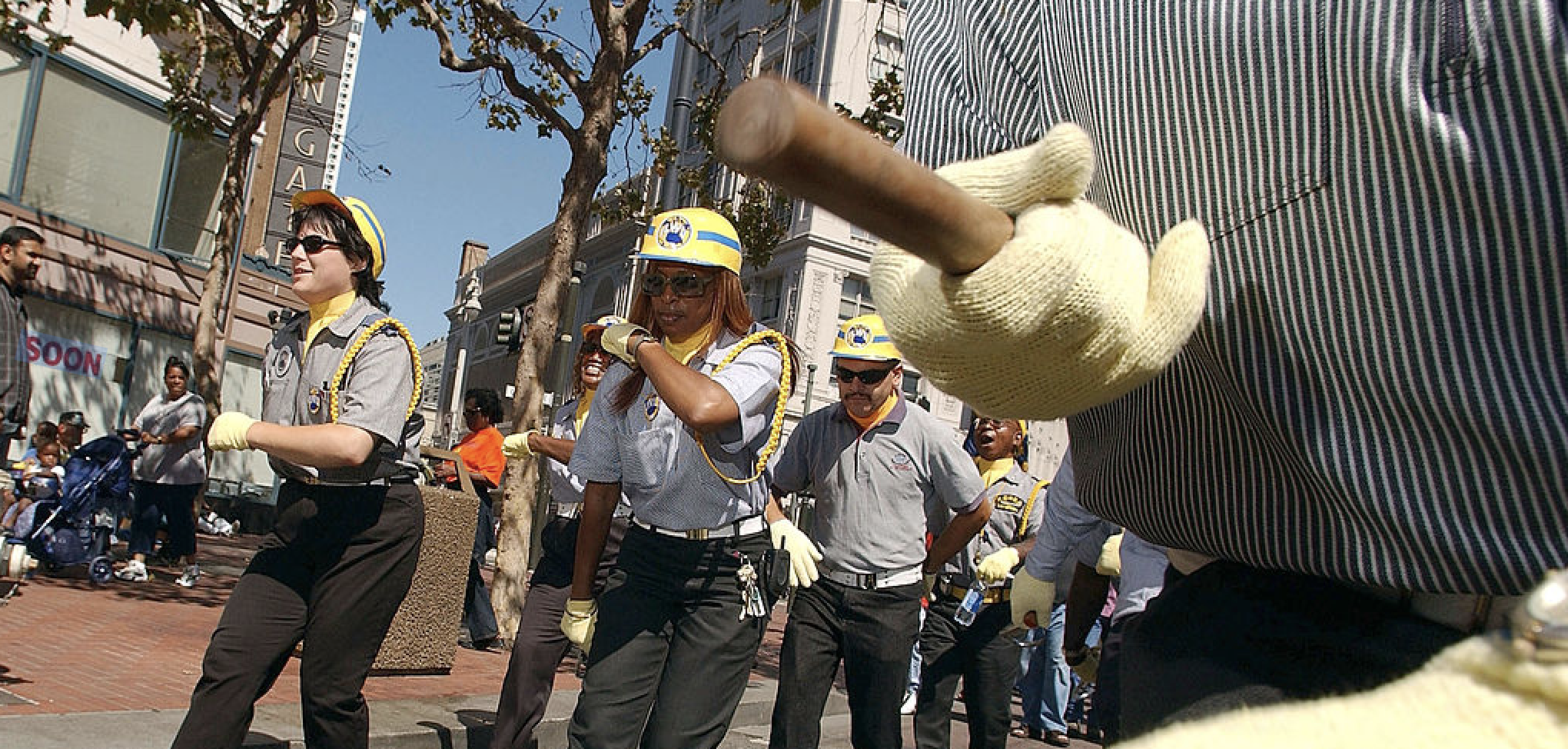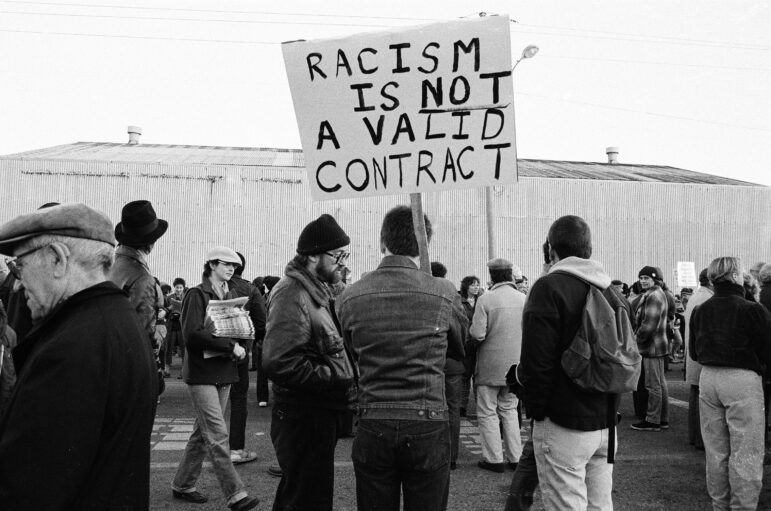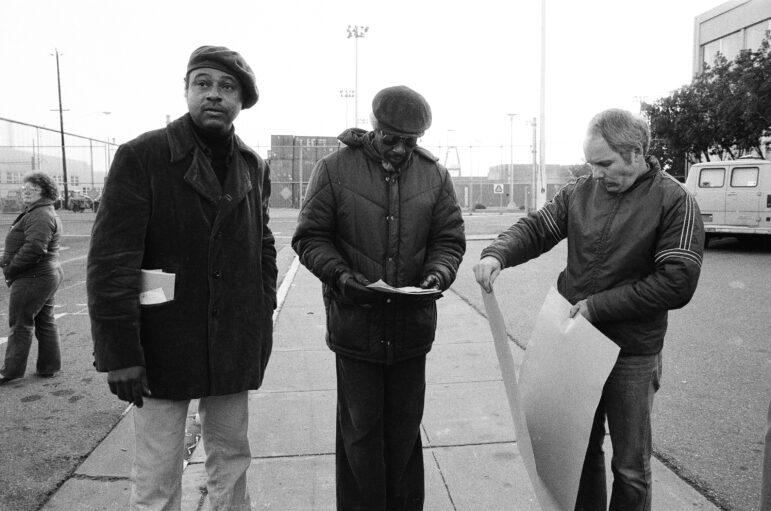
Members of the Local 10 ILWU drill team march down Market Street in a send-off event for the Immigrant Workers Freedom Ride on September 20, 2003 in downtown San Francisco. (Photo: David Paul Morris/Getty Images)

Share
This article is a joint publication of Workday Magazine and The Nation.
In 1984, Larry Wright and his coworkers in International Longshore and Warehouse Union (ILWU) Local 10 refused to unload goods shipped from South Africa in solidarity with that country’s anti-apartheid movement. This boycott at the San Francisco pier, which lasted 11 days, sent reverberations throughout the US labor movement, where major players like the AFL-CIO still were not yet willing to endorse the anti-apartheid movement’s boycott campaign.
Now, nearly 40 years later, 81-year-old Wright is involved in another effort to move the labor movement toward global solidarity: As a retiree who can speak but not vote at union meetings, he was part of a successful push within the same Local 10 to pass a resolution demanding an immediate cease-fire in Gaza. The measure passed unanimously at a November 18 general membership meeting of the union, which is based in the Bay Area and has around 1,700 members.
“It’s really important that as many people as possible are opposing what’s happening, and Local 10 is one of the unions that leads the way with supporting a struggle like this,” he said over the land line at his house in Oakland. “So I think it’s really important that the unions come out and oppose this terrible violence on the Palestinians.”
The resolution, which was sent to Workday Magazine and The Nation, cites the appeal from the Palestinian General Federation of Trade Unions (PGFTU) for union solidarity with Palestinians. Over the past 45 days, the Israeli military has killed at least 13,300 people in Gaza, including 5,600 children, according to the Health Ministry, which amounts to one out of every 200 people in Gaza. Local 10’s resolution sends “a message to the PGFTU expressing our solidarity and determination to take action in their defense consistent with our actions in the past and ILWU’s principled position of defending Palestinian rights.”
The resolution calls the October 7 Hamas-led surprise attack that killed an estimated 1,200 Israelis “indefensible,” and states that “the UN calls Gaza an ‘open air prison’ of 2.2 million Palestinians. Under such repressive conditions it is no surprise that there would inevitably be a rebellion but this in no way justifies Israel’s genocidal bombing of civilians in Gaza.”
“We additionally call on other trade unions both nationally and internationally to support PGFTU, a ceasefire and an end to Israeli apartheid oppression,” the resolution says. (Numerous human rights groups say Israel’s treatment of Palestinians amounts to apartheid.) A Local 10 official will read the resolution to the Oakland and San Francisco city councils, and the union will encourage the ILWU International and District Councils to pass similar resolutions, the resolution states.
Trent Willis, a current member and former president of Local 10, voted in favor of the resolution at the general membership meeting, which was attended by roughly 200 people. “Our members are very concerned about news we’re hearing about innocent civilians being killed in the Gaza Strip right now,” he said over the phone. “And it’s not only our membership, but there are protests going on all around this country for a cease-fire.”
A growing number of local, state, regional, and even some national unions have issued similar calls for a cease-fire, a demand that is supported by a majority of people in the United States. The United States is supplying and politically backing Israel’s actions, and the Biden administration is seeking a significant increase in US military aid, even as humanitarian groups warn that Israel is indiscriminately targeting civilians. Among US labor’s supporters of a cease-fire are the United Electrical, Radio and Machine Workers of America (UE) and the leadership of the American Postal Workers Union. Yet, most national unions, and the AFL-CIO, have so far declined to follow suit.
Peter Cole, a professor at Western Illinois University and the preeminent historian of Local 10, says dock workers are well-positioned to push this effort forward. “Maritime workers, dock workers, and sailors look outwards, not inwards,” he said over the phone. “They are constantly interacting with people and cargo around the world.” Local 10 members operate cranes that take containers on and off ships, drive trucks that move containers within the port, load and unload cargo from international shipping vessels, and secure containers on those vessels, among other jobs.
“Back in the ’90s, the San Francisco Labor Council called Local 10 the conscience in the labor movement,” he said. “I think that holds true.”
Local 10 is perhaps best known for taking a principled stand against South African apartheid. This organizing goes back to at least 1962, when Local 10 refused to cross a community picket of South African goods at San Francisco Pier 19, in what Cole wrote was very possibly the “first anti-apartheid action ever taken by a labor union in the United States.” In response to a 1976 uprising in the Black segregated Soweto Township, when police opened fire on Black students, killing an estimated 176 to 700 people, Local 10 members formed the Southern Africa Liberation Support Committee. Led by Leo Robinson, a Black longshoreman in Oakland, this committee was endorsed through a rank-and-file vote, which provided infrastructure for anti-apartheid organizing in Local 10, alongside other solidarity with liberation movements.
Wright, who was active on this committee, remembers “setting up literature tables in union halls, and collecting clothing, food, and books” to ship to African liberation movements in South Africa, Mozambique, Angola, Zimbabwe, and Namibia, as a show of material support. These donations were a physical presence in union life, he said, which also made them an “educational opportunity.”
Wright said that “for me, personally, I was involved in supporting the struggles in southern Africa because they were struggles against imperialism and colonialism, against the exploitation of peoples in those countries.”
Local 10 organized a series of actions in the late 1970s, but its biggest protest came in 1984. For 11 days, members boycotted South African goods carried aboard the Nedlloyd Kimberley, docked at San Francisco’s Pier 80. “We voted at a union meeting that we wouldn’t work this ship,” said Wright. “We had support from churches, from the gay community, from other unions. We had community supporters come picket. It’s easier to refuse to work if there’s a picket line. But even if there hadn’t been a picket, members wouldn’t have worked, because it was union policy not to work that ship.”
The union took this move even though its contract did not permit such a work stoppage, putting it at risk of retaliation. As word spread, crowds of community supporters flocked to Pier 80, “singing, chanting, and making witness,” Cole wrote in a historical essay. For the duration of the boycott, all of the South African cargo remained in the hold of the ship, even as workers handled goods from other countries. It was only when a federal judge threatened an injunction, which could include prison times, that the boycott ended. “The workers, having made their point, unloaded the cargo,” Cole noted.

The 1984 boycott at the pier where Nedlloyd Kimberly was anchored. (Photo: courtesy of the Archive of Candy Wright)
By taking this action, Local 10 was ahead of the leadership of the AFL-CIO. While the federation opposed apartheid, AFL-CIO president Lane Kirkland “was hesitant to support a full-blown boycott and divestment campaign against South Africa, worried about the African National Congress and Nelson Mandela being too far left,” explained Jeff Schuhrke, an assistant professor of labor studies at SUNY Empire State University in New York City, who has written a book about the foreign policy of the AFL-CIO, which will come out next year. “Meanwhile, the whole South African anti-apartheid movement was saying we want you to boycott and divest, this is a tactic that will help us end apartheid.”
Local 10 was not alone. Other unions in the AFL-CIO—like the United Mine Workers, United Auto Workers, and AFSCME—would soon be stepping up their boycott and divestment efforts. These efforts almost certainly played a role in pressuring the AFL-CIO to eventually endorse the boycott and divestment strategy in 1986, alongside pressure from Black South African trade unionists, Schuhrke explained. In 1990, speaking at the Oakland Coliseum, Nelson Mandela saluted Local 10 for the 1984 boycott, declaring that the workers “established themselves as the front line of the anti-apartheid movement in the Bay Area.”
This 1984 action is part of a longer history that continued through the 2000s. “The ILWU has been one of the more internationalist oriented unions, recognizing the importance of solidarity around the world and standing up for freedom and justice and against imperialism and colonialism and apartheid,” Schuhrke explained. On May Day, 2008, workers at 29 West Coast ports launched a one-day strike to protest the wars in Iraq and Afghanistan, and ILWU members refused in 2010, 2014, and 2021 to handle cargo on Israeli ships, in response to community pickets against the repression of Palestinians. As labor journalist Kim Kelly reported for In These Times, “In 2020, the ILWU also shut down ports for 8 minutes and 46 seconds in solidarity with George Floyd, Breonna Taylor and all other victims of racist police violence.”
Today, opposition to Israel’s military actions in Gaza is animating protest movements throughout the world. This includes mass marches and a flurry of direct actions throughout the United States, where union members have been numbered among those taking to the streets, and demanding that members of Congress support a cease-fire. Lara Kiswani, a Palestinian American and executive director of the Arab Resource and Organizing Center (AROC), said that “we are particularly heartened by Local 10’s commitments to put its resolution to action.”
“For generations, our movement has found inspiration in Local 10’s commitments to social justice and internationalism—from its militant fights for worker power here in the US, to its unrelenting support of the South African anti-apartheid struggle, to its refusal to work Israeli ships profiting from the oppression of the Palestinian people.”
Throughout his organizing, Wright spent years working out of Local 10’s union hall, where he was dispatched to a variety of jobs, from laboring in the hull of the ship to latching containers, before switching to operating cranes and moving containers once he obtained more seniority. (He eventually switched to ILWU Local 91 after a promotion.) He saw how his union held moral power, because of their long history fighting against oppression.
“The ILWU is so respected,” he said, “that when it makes a call for people to join in opposing what’s happening to the Palestinian people, I think it carries a little extra significance, because of our history of supporting people’s struggles.”

Larry Wright (right), Leo Robinson (center), members of Local 10’s South African Liberation Support Committee (SALSC), which formed in response to the 1976 Soweto uprising. (Photo courtesy of the Archive of Candice Wright)

